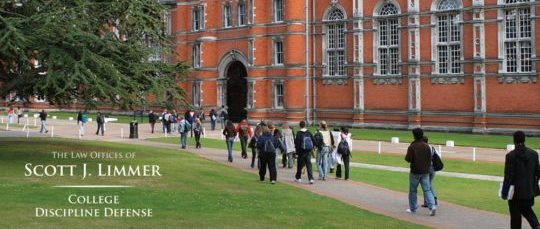Previous articles 1 & 2 have spelled out why college or graduate schools often do a seriously bad job handling investigations, hearings and decisions on disciplinary charges against students. They’ve detailed how students are often denied due process in many campus disciplinary hearings that, for example, forbid students from having legal representation during hearings, fail to spell out or properly investigate charges, or give school officials virtual carte blanche in presenting and deciding cases.
Any lawyer who has tried to help students in school disciplinary proceedings will have stories of almost unbelievably unfair procedures, unlike those found in any hearings elsewhere, and painfully amateurish or arbitrary decision making.
For example, I once represented a client at a school disciplinary hearing in which the top campus security official offered testimony that two other students had reported my client had used drugs during the current semester. The “testimony” contained no details whatsoever on where or when the alleged drug use took place. The “informants” also chose to remain anonymous, and school officials bringing the case made no attempt to reveal the informants’ identity, much less their reliability or potential animus towards the accused. It probably goes without saying there was no opportunity to confront or cross-examine the nameless accusers.
Adding to the proceeding’s absurdity: the charges the student faced had nothing to do with his use or possession of drugs. In any objective criminal court, the “evidence” would have been excluded as hearsay, irrelevant and prejudicial. Similarly, the accused would have been accorded the constitutional right to confront and cross-examine accusers — but not at this institution of higher learning.
As recognition mounts of the serious flaws in college disciplinary hearings, a variety of proposals have been offered to mend it. Some of these suggestions would in fact make things far worse, not better. The U.S. Department of Education’s Office of Civil Rights (OCR), which is supposed to protect students’ civil rights on campus, in fact has taken the lead in suggesting new ways schools should trample on the rights of students facing school disciplinary hearings.
For example, when post-secondary students face school disciplinary hearings on charges of sexual misconduct (the term encompasses a wide range of accusations, ranging from unwelcome advances up to assaults), OCR has urged schools not to accord an accused the presumption of innocence, which is automatic in any real court in the land.
Instead, OCR argues for a “preponderance of the evidence” standard — meaning that whoever is deciding the case (usually a group of academics, school staffers or students, all likely to have little or no appreciation of the civil and legal rights issues) need only view the case against an accused as slightly stronger than the case presented by the defense.
When Harvard University set rules to be used university-wide in disciplinary hearings on complaints of sexual misconduct, a good part of its law faculty (whose views had not been sought) joined a letter slamming the procedures, closely based on OCR’s recommendations, for lacking “the most basic elements of fairness and due process” and being “overwhelmingly stacked against the accused.” Why would a college pay attention to OCR’s “guidance”? Perhaps because the agency has the authority to block all federal funds to schools it sees as failing to safeguard students’ rights — as measured by its unfair interpretations.
That’s not the end of dubious ideas bubbling out of the federal government. A White House federal task force working on campus sexual assaults touted this brainstorm well over a year ago: turning nearly all phases of such cases to a “single investigator,” who would investigate the case; interview the accuser, the accused and any witnesses; and then decide the case or advise a school tribunal on how to resolve it.
Not surprisingly, a non-profit group dedicated to protecting student rights in school disciplinary hearings lambasted this proposal as empowering one likely ill-trained or untrained student or staffer to serve as an all-in-one “detective, prosecutor and judge.” A far better suggestion would be, in appropriate cases, for campus officials to bring in an independent investigator, one trained and experienced in the ways student rights would be protected in the world outside the campus gates.
The North Carolina legislature recently adopted a first-in-the-nation law, which deserves wider consideration: it guarantees public college and university students the right to hire and be accompanied by an advocate, who could “fully participate” in campus disciplinary hearings.
The new law isn’t perfect: it exempts proceedings run solely by students, and doesn’t apply to the state’s private-school students. But getting similar provisions adopted by other states, and having OCR change direction to promote, rather than campaign against, the rights of students accused in school disciplinary proceedings, would be significant improvements.
